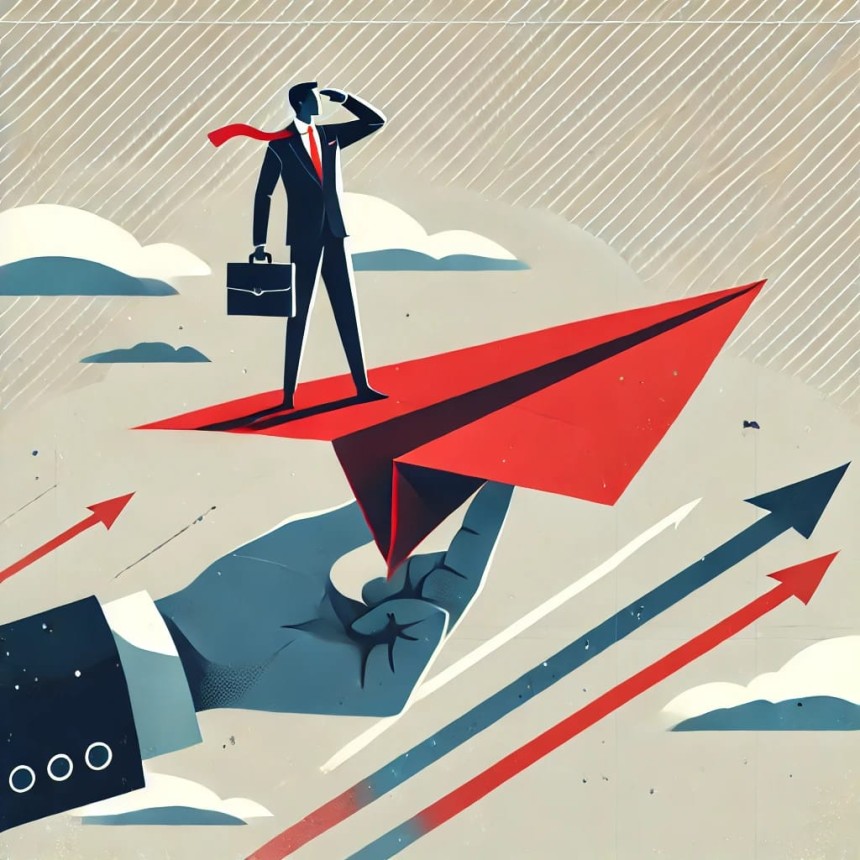
5 Reasons: Why Looking Poor is So Important
If you want to become rich, you need to look poor. Today, I’m going to cover five reasons why looking poor is so important and three things you need to start doing today.
Here, we go!
1. Different Classes Perceive Money Differently.

People who are poor see money as something to use to clear their bills and get by in life. The middle class sees money as something they can use for a bit of comfort; they take on liabilities like car loans or credit card debt.
However, the wealthy see money as a tool. They use it to buy assets like stocks and real estate to generate more money, which can then pay for their liabilities.Example:
- Take Warren Buffett, for example. He's worth over $100 billion, but he still lives in the house he bought in 1958 for $31,500.
- There's Mark Zuckerberg, who often wears just a gray t-shirt and a hoodie.
- Jeff Bezos was still driving a 1997 Honda Accord years after becoming a billionaire, saying, "This is a perfectly good car." Fun fact: 61% of people earning more than $250,000 a year are more likely to drive Hondas, Fords, and Toyotas.
The truth is, wealthy people don't need to look rich because they have their priorities straight. They already know what's important to them and don't need to prove anything to anyone. This is a fantastic mindset to develop, especially if you're on your financial journey, whether it's to pay off debt, improve your credit score, or build an emergency fund. If you're investing in yourself, you don’t need to prove anything to anybody else.
2. Trying to Look Rich Can Get Very Expensive

A 2014 Federal Reserve report found that the gap between a household's income relative to its close neighbors will impact its level of debt. In psychology, this is called "keeping up with the Joneses." Once you start doing this, you're likely to have a bad time.
Essentially, keeping up with the Joneses is when you use your neighbors as a measuring stick for success. For example, if you're looking to buy a car to drive to work and you're about to purchase a Toyota Camry for $20,000, which will do the job well and can be paid outright in cash because you've saved up that $20,000. But then you see your neighbor with a brand-new Tesla Cybertruck. In order to keep up with the Joneses, instead of getting the Camry, you decide to get a $100,000 Porsche Cayenne. You don't have the extra $80,000, but you're fine with taking out a loan to cover the price difference.
That $100,000 Porsche Cayenne will end up costing you over $150,000 when factoring in the additional $80,000 loan, hundreds of dollars in monthly interest payments, insurance, thousands in maintenance costs, and the 60% depreciation in value over time.
When people sacrifice their financial goals and take on debt just to buy luxury products, it becomes incredibly difficult to escape the debt spiral. As of 2023, the average American has about $66,000 in credit card debt. If your credit card bill is $6,000 with a 24% interest rate, and you only make the minimum payments each month, it will take you over 25 years to pay off your debt, totaling $17,330—nearly three times the original amount due to interest.
However, the worst part isn't even the debt itself—it's the opportunity cost. Money spent on something is money not spent on something else. For instance, spending $80,000 more on a nicer car means you can't invest that money in something like the stock market. If you had invested that $80,000 in the S&P 500, which has an average return of 10%, you'd have over $200,000 in just 10 years—enough to buy two Porsche Cayennes outright: one to drive and one as a trophy to show off to your neighbor.
3. The Impact on Mental Health

Succumbing to societal pressures to appear wealthy doesn’t just lead to a spiral of debt—it can also cost you your most valuable assets: your peace of mind and mental health. A 2023 study found that the bigger the wealth gap in a neighborhood, the worse the mental health of its residents. Psychology explains this through the social comparison theory. Essentially, people don’t necessarily feel bad or sad because of their income—whether they make $30,000 or $150,000 a year. Instead, their feelings of sadness are relative to the income of those around them.
For example, you could be earning six figures a year, have a decent amount of savings, and own your own house. But if you associate with or live near multi-millionaires who own multiple vacation homes, chances are you’re going to be much more unhappy than if you were a broke college kid living in a shared apartment with other broke students. According to the social comparison theory, it’s human nature to always compare ourselves to others—whether that’s strangers, family members, or neighbors. The problem is, constantly comparing yourself with negativity can impact your mental health and personal happiness, because there will always be someone wealthier than you.
Talking about mental health, I’d like to share something personal. I didn’t grow up with money. My parents did everything they could to save; they bought my clothes in bigger sizes so I could wear them for years. I realized that growing up without money can lead to financial baggage and trauma, which negatively impact you later in life.
4. Paying More for the Same Services

Trying to look wealthy can make things more expensive for you. A 2018 study asked people how much they would charge a potential client for their services. Some participants were shown a photo of a potential client who looked really fancy and wealthy, while others were shown the same person, but dressed more casually. Overwhelmingly, participants quoted a significantly higher price for the client who looked wealthy, even though it was the same exact person.
In another study, participants were asked how much they would charge someone with a new Mercedes-Benz versus someone with an old Mitsubishi car for a car wash. Again, participants quoted a significantly higher price for the Mercedes-Benz owner. So, unless you want to pay extra for the same service, you might not want to dress too fancy.
But it's not just about being charged more money — trying to look wealthy can also affect your relationships. Many people want to appear wealthy to feel accepted in society or to show they’ve "made it." However, a study from the Ross School of Business found that flashy displays of wealth might have the opposite effect.
The study showed 395 people social media profiles of others. Some profiles had modest updates, while others showed off luxury items, expensive clothes, cars, and vacations. Although those with flashy posts were perceived to be wealthier, participants believed they were trying to signal status and were more self-interested. As a result, people were less likely to form genuine connections with them and less likely to invite them into social groups.
In this case, the social cost of trying to appear wealthy outweighs the benefits, making it harder to form authentic connections — which defeats the purpose of wanting to look wealthy in the first place.
5. Long Term Vision

Looking poor allows you to focus on what truly matters. For me, that’s becoming financially free, so I can retire by 35 without a care in the world. When you stop trying to keep up with the latest trends or impress others—like constantly buying the newest phone, the nicest clothes, or a brand-new TV to see the hair follicles on Leonardo DiCaprio—you make your financial dreams, such as retiring 20 years early, much more achievable.
For every 5% of additional income you save, you can retire several years earlier. For example, if you earn the median income of $65k per year and save 10% ($6,500), you could be financially free in 51.4 years. But if you manage to save just 5% more, or 15%, you could be financially free in 42.8 years. That extra 5% saves you more than 8 years of work!
It’s not just about saving more money. It's about transforming your lifestyle so you need less to be comfortable. For instance, if you once lived on $80,000 a year but reduced your expenses to $60,000 a year, you now need significantly less to retire comfortably.
3 Things to Start Doing Today

I'm not saying you need to look homeless to be financially responsible; instead, I want you to find a balance that works for your financial health. Here are three strategies that have significantly helped me in this journey, and I believe they can help you too:
1. Shift Your Mindset: The first step is to stop focusing on outward symbols of success, like expensive cars or flashy clothes, just to show off to others. True success comes when you're working toward or have already achieved your financial goals. Use those personal financial dreams as your benchmark for success—not what society says.
For example, one of my financial dreams is to become financially independent. For me, that’s the ultimate sign of success. When I reach that point, I won’t need to worry about what others think because I’ll be able to help my parents financially whenever they need support, travel the world on my own terms, and attend every important event in my future children's lives, like their games, concerts, and performances—without ever having to say, “Sorry, I have to work.”
That’s what defines success for me: the freedom to live on my terms and support the people I care about. You might have a different financial dream, but make sure that becomes the measure of your success, not material comparisons. If you’re not sure what your next step should be in achieving your financial dreams, I’ve created a free five-question quiz that can help you design a personalized wealth plan. You can find the link below.
2. Implement the Box Strategy: Many of us fall into the trap of comparing ourselves to others, thinking, “If my friend looks wealthy, then I need to look wealthy too.” This can turn into an endless cycle where you're always trying to keep up with someone else’s financial status, even though there will always be someone wealthier.
Think about it: even Warren Buffett, one of the wealthiest people in the world, has less money than Bill Gates, and both have less than Jeff Bezos. If even billionaires don’t rank at the top, then you can see how pointless it is to compare yourself to others.
Instead, I recommend using the Box Strategy. Picture all your past financial accomplishments—no matter how big or small—and imagine placing them in a box. Your goal now is to fill a new box with even greater achievements, constantly striving to outdo your past self, not other people.
This shift in mindset is much healthier and more productive. You’re comparing yourself to who you were yesterday, not someone else.
3. Accept the Journey: Finally, even when you’re doing everything right—budgeting, investing, saving—you might still feel like it’s not enough. That’s a common feeling, and it often stems from habits you don’t even realize are holding you back. These are what I call "middle-class habits"—behaviors and mindsets that keep people stuck in the financial rat race.
To break free, you need to recognize these patterns and make conscious changes. For example, the middle-class mindset often revolves around earning more just to spend more, rather than focusing on building wealth through smart investments and long-term financial planning.
________________________________________________________Thank you !





